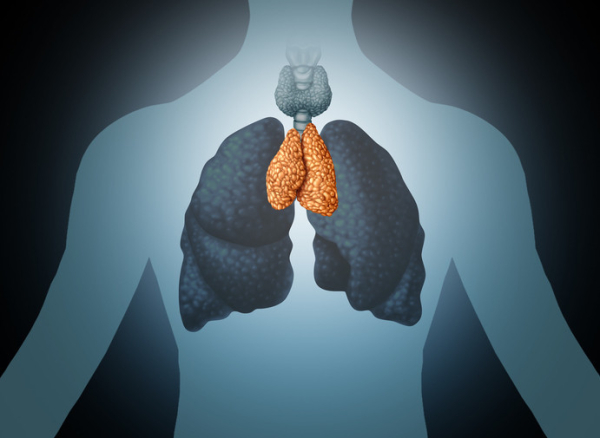
Quick, point to your thymus gland.
If you pointed to the front of your upper chest, well done! The thymus gland sits just behind the upper part of the breastbone, between the tops of the lungs and in front of and above the heart. In newborns, the thymus gland may be 2.5 inches long and weigh 1 ounce, but it shrinks over time beginning in the first year of life.
If you pointed elsewhere or had no idea, don’t feel bad. For most people, the thymus is unfamiliar and so is its whereabouts. And, for good reason: in most adults, the thymus gland is a tiny gland that’s been largely replaced by fat. But it wasn’t always that way.
How does the thymus gland help the immune system?
During fetal development, infancy, and early childhood, the thymus gland is quite important for the developing immune system. That’s when the thymus produces a special type of immune cells called T-cells (named for the thymus gland).
T-cells are essential to healthy immune function because they can kill cells infected by bacteria or viruses. They also attack tumor cells and help regulate other parts of the immune system.
Do you actually need your thymus gland?
The answer to this question depends on whether you are a developing fetus, young child, or adult. For the fetus and young child it’s quite essential, as noted above.
But there’s been uncertainty regarding the role of the thymus gland among adults. One reason is that over time it becomes a shrunken vestige of its former self, weighing in at a fraction of an ounce and shrinking to just one inch.
In addition, adults seem to do just fine without a thymus gland if it needs to be removed as a treatment for certain diseases, such as cancerous or benign tumors. Along with medications, thymus removal (thymectomy) may be part of treatment for myasthenia gravis, an autoimmune disease that causes muscle weakness, droopy eyelids, and double vision. The thymus gland seems to be the source of abnormal immune cells that cause this disease.
Rethinking the importance of the thymus gland in adulthood
Growing evidence suggests the thymus gland might play a role in the health of the immune system, and overall health in adults, for much longer than previously thought. For example:
- The thymus gland continues to produce T-cells well into adulthood, though at a slower pace. In addition, newer scanning technology suggests less shrinkage of the organ than had been reported in the past.
- Even though the thymus gland’s function declines over time, it may help adults fight off infections, such as HIV and COVID-19.
- A 2023 study concluded that people who had their thymus removed during adulthood had higher rates of cancer, autoimmune disease, and death than people who had other types of surgery.
Along with other research, this suggests that we may have underestimated this gland’s function and importance in adults.
The bottom line
There is much we don’t know about the thymus gland, but one thing seems certain: most people are unaware of its major contributions to immune function and overall health.
Future research may change how we think about the importance of this gland, especially its role among aging adults. But well before that happens, I think the thymus gland deserves more recognition and respect. Without the thymus gland, we’d be prone to childhood infections and shorter lifespans. By the time we’re old enough to appreciate it, this amazing gland has already helped create a well-functioning immune system that protects us from health threats we face throughout our lives.
It’s truly amazing what a small, shrunken gland can do — or has already done — for you.
About the Author

Robert H. Shmerling, MD, Senior Faculty Editor, Harvard Health Publishing; Editorial Advisory Board Member, Harvard Health Publishing
Dr. Robert H. Shmerling is the former clinical chief of the division of rheumatology at Beth Israel Deaconess Medical Center (BIDMC), and is a current member of the corresponding faculty in medicine at Harvard Medical School. … See Full Bio View all posts by Robert H. Shmerling, MD